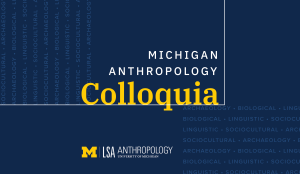Presented By: Department of Anthropology
Sociocultural Anthropology Colloquium | "No Place For Those Who Suffer: Surviving Trauma in Exile"
Mayssa Rekhis, M.D., Ph.D., Lecturer, School of Public Health and Community Medicine, Gothenburg University

"Succeeding to previous regimes of migrants as laboring (Sayad 2004) and suffering bodies (Fassin 2013, Ticktin 2011), and to the trauma regime of victimhood (Fassin and Rechtman 2009), a trauma regime of survival is emerging in public discourses, re-shaping psychotherapeutic practices and migration policies.
Based on ethnographic evidence from fieldwork in a trauma-therapy center for refugees in Sweden, this presentation will illustrate how the expectation from exiles nowadays is to overcome their suffering _ the suffering based on which they were granted asylum_ so they survive and integrate into the host societies. There is no place for refugees’ suffering in the countries of exile when survival becomes proof of their deservingness. In this context of forced exile, autonomy, and survival become closely linked to, if not defined by, integration, which is, at the same time, hindered by racism, discrimination, and othering policies. This superposition of trauma survival and integration creates a hard-to-break-from conundrum for exiles, as they are expected to heal to integrate when healing is almost impossible in disintegration.
This 'survival regime' has impacted migration and integration policies. It allowed perceptions of and expectations from refugees in Western European host countries to change, opening the possibility for policymakers to perceive refugees not only as people to protect based on international law obligations but also (and mostly) as an economic opportunity and a dividend. It has also deeply reshaped therapeutic practices, disrupting the roles of psychiatrists and psychotherapists, and redefining what 'therapeutic' and 'psychological recovery' mean."
Mayssa Rekhis is a Medical Doctor, who graduated from the University of Tunis el-Manar, Tunisia, and an anthropologist, holding a Ph.D from the School of Advanced Studies in Social Sciences EHESS - Paris, France. She is a researcher, educator, and activist, and works at the intersection of these roles, with a focus on health, social justice, and migration. She has more than a decade of experience working in SWANA (South West Asia and North Africa), East Africa, and Europe, both as a researcher and as a practitioner with experience mainly in the non-profit sector. As a researcher, she explores humans' experiences with extreme violence, trauma, suffering, and exile, and is interested in the roles of psychiatry and psychotherapies, mechanisms and processes of subjectivation, and healing. She is currently working in the School of Public Health and Community Medicine at Gothenburg University, in Sweden, as a lecturer.
Based on ethnographic evidence from fieldwork in a trauma-therapy center for refugees in Sweden, this presentation will illustrate how the expectation from exiles nowadays is to overcome their suffering _ the suffering based on which they were granted asylum_ so they survive and integrate into the host societies. There is no place for refugees’ suffering in the countries of exile when survival becomes proof of their deservingness. In this context of forced exile, autonomy, and survival become closely linked to, if not defined by, integration, which is, at the same time, hindered by racism, discrimination, and othering policies. This superposition of trauma survival and integration creates a hard-to-break-from conundrum for exiles, as they are expected to heal to integrate when healing is almost impossible in disintegration.
This 'survival regime' has impacted migration and integration policies. It allowed perceptions of and expectations from refugees in Western European host countries to change, opening the possibility for policymakers to perceive refugees not only as people to protect based on international law obligations but also (and mostly) as an economic opportunity and a dividend. It has also deeply reshaped therapeutic practices, disrupting the roles of psychiatrists and psychotherapists, and redefining what 'therapeutic' and 'psychological recovery' mean."
Mayssa Rekhis is a Medical Doctor, who graduated from the University of Tunis el-Manar, Tunisia, and an anthropologist, holding a Ph.D from the School of Advanced Studies in Social Sciences EHESS - Paris, France. She is a researcher, educator, and activist, and works at the intersection of these roles, with a focus on health, social justice, and migration. She has more than a decade of experience working in SWANA (South West Asia and North Africa), East Africa, and Europe, both as a researcher and as a practitioner with experience mainly in the non-profit sector. As a researcher, she explores humans' experiences with extreme violence, trauma, suffering, and exile, and is interested in the roles of psychiatry and psychotherapies, mechanisms and processes of subjectivation, and healing. She is currently working in the School of Public Health and Community Medicine at Gothenburg University, in Sweden, as a lecturer.